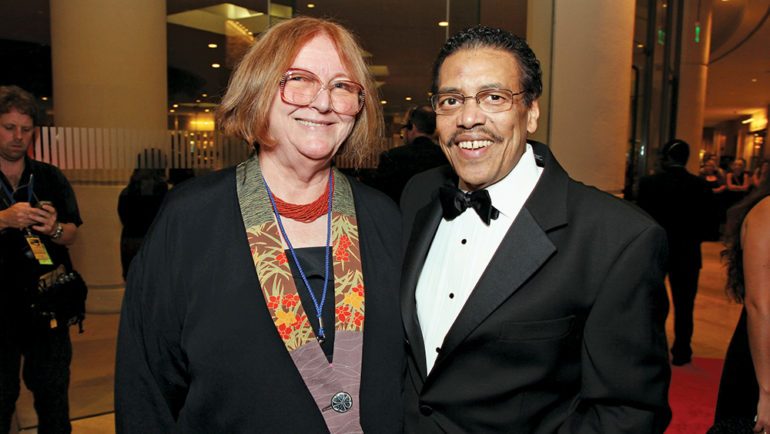American Cinematheque Co-Founder Barbara Smith Reflects on 37 Years
By Shalini Dore
LOS ANGELES (Variety.com) – Barbara Smith and the American Cinematheque have been synonymous since she helped found it in the early 1980s with Gary Essert and Gary Abrahams. After a 37-year career, Smith is retiring from her post as exec director of the Cinematheque.
Her last event will be the screening of a restored version of “Rosita” on Dec. 7 at the Egyptian Theatre.
Smith, Essert and Abrahams incorporated the Cinematheque while they were still at the legendary Filmex, the Los Angeles Intl. Film Exposition, which ran from 1971 to the 1980s.
“We decided that we worked really hard all year to create the three-week festival, so if we did just a little more work, we could turn what we were doing into a year-round film program — a Cinematheque,” Smith says. “We were still doing Filmex when we started the in 1981. The festival had about 100 employees and just as many or more volunteers.
“When we were starting out, we would not have listened to naysayers,” she says. “We didn’t have astounding amounts of support.”
Her husband, the late editor Howard Smith (“Breakfast at Tiffany’s”) suggested they start with a permanent home. Initially the trio thought that would be the Pan-Pacific Auditorium, but when that fell through, they tried the DGA. But that didn’t work out either, as the Directors Guild could not give them every weekend as they wanted.
“Smith recalls that there were other attempts before the Cinematheque landed at the Egyptian. One was a proposed development at Hollywood & Highland, but in the 1980s, it went nowhere because “people gave up on Hollywood.”
Her co-founders Essert and Abrahams died of AIDS in 1992, but Smith continued the Cinematheque’s quest, negotiating with Los Angeles’ Community Redevelopment Agency to buy the landmark Egyptian Theatre, which had fallen into disrepair, for $1 that year. The city wanted to revitalize Hollywood and saw the theater, dating to 1922, as a central part of the plan.
But there were problems. There was a large oil tank, used to the heat the theater, buried underground with vents under the seats. “The tank was a complete surprise. No one knew it was there until we started the renovation,” Smith says.
She became project manager for the $15 million renovation, which was completed in 1998.
She recalls that Max Palevsky, backer of the Aero Theater project, felt strongly about audiences on the Westside being offered American Cinematheque programming and was against the Egyptian.
“This part of Hollywood Boulevard was really terrible back then. Even though the CRA and the city were behind the project, it was a fairly shaky proposition. But it made sense to be on Hollywood Boulevard, which was the home of the movies.”
Smith also negotiated for a long-term lease of the Aero in Santa Monica so the Cinematheque had two permanent venues to screen movies. The Aero’s owner, Jim Rosenfield, had been in negotiations with Sundance, which planned its own string of theaters, but when that proposal fell through, he contacted Smith. The refurbished Aero, under Cinematheque operation, reopened in 2005.
Rick Nicita, Cinematheque board chairman, says: “Barbara Smith’s significant contributions to the motion picture industry and the Hollywood community go even beyond her distinction as founder of the American Cinematheque.
By establishing the American Cinematheque’s continuing presence at the Egyptian Theatre in 1998, she ensured that Hollywood would be a permanent destination for filmgoers from all over the world.”
To fund these projects, the Cinematheque had an arm called Premiere Patrons. The head of the Premiere Patrons at the time, Lynn Wasserman, conceived the idea for the Cinematheque’s big awards show. She got Eddie Murphy, who was filming at Universal at the time, to be the first honoree in 1986.
“There was a big penis on stage,” Smith says of the Robin Williams’ event. “I think it was Billy Crystal who wanted to appear with it. Then it was stolen from backstage.”
Smith has memories of the gala, which started out as the Moving Picture Ball and included dancing after the presentation. The USC marching band came on for Ron Howard in 1990 and Spinal Tap performed at Rob Reiner’s show in 1994. “Sid Sheinberg wanted to hang a 15-foot replica of Tom Cruise’s airplane over his dinner table the year [1996] we honored him.”
Looking to the future, Smith does not see streaming services as competition.
“I think that services like Netflix increase our business. They acquaint audiences with a wider choice of films and people seek out more of these types of experiences. If they learn to love the films of a certain director and they see that director is coming to the Cinematheque to talk, they make it a priority to attend. Part of what we always did was to educate our audience and potential audience as to why they should watch movies on the big screen as they were meant to be seen.”

